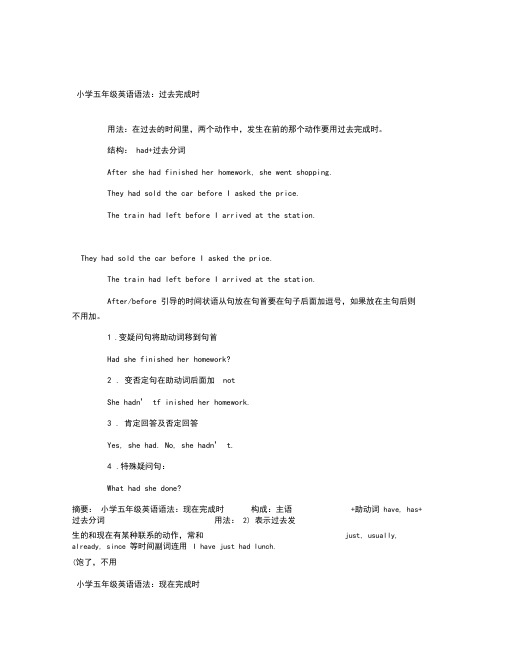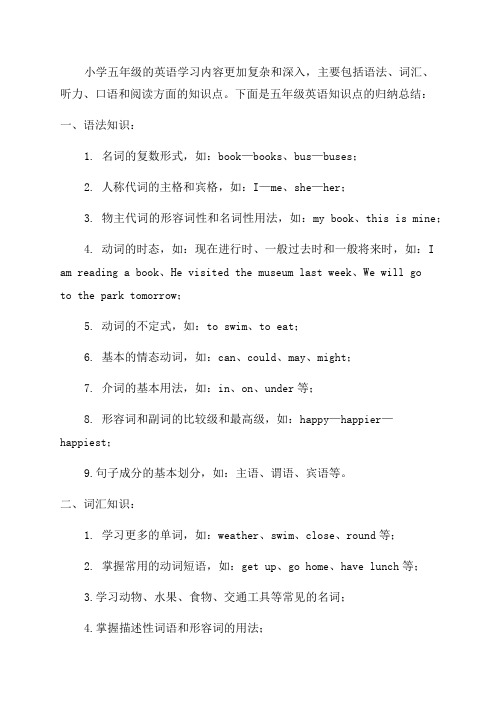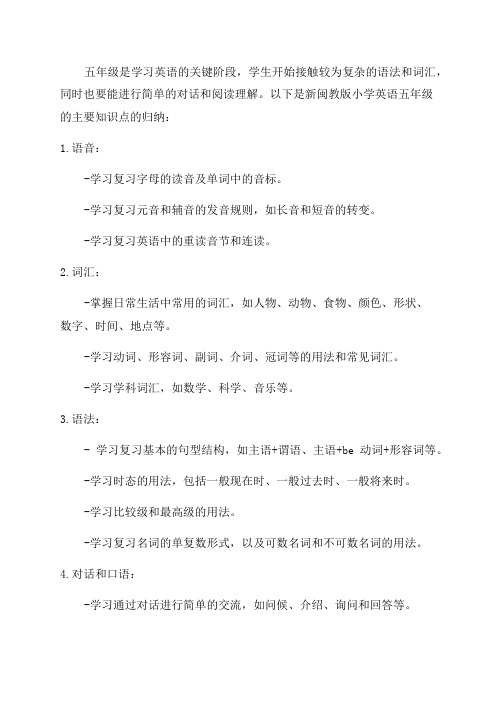小学五年级___英语辅导资料整理
小学英语译林版五年级下册Unit5 复习资料

Unit5Helping our parents复习资料词组:1.sweep the floor扫地2.wash the dishes洗碗3.make the bed整理床铺4.wash clothes洗衣服5.clean the car洗车6.clean the table擦桌子7.cook breakfast/dinner做早/晚饭8.in the kitchen在厨房9.be busy忙碌的10.help their parents帮助他们的父母11.watch TV看电视12.Saturday morning星期六早晨13.in the living room在客厅14.eat fruit吃水果15.grow grapes种葡萄16.big and sweet又大又甜17.listen to…听…18.in his garden在他的花园19.go away走了,离开20.some pests on the grapes在葡萄上的害虫21.so sweet如此甜22.to be continues未完待续句子:1.My father is cleaning the car.I am helping him.我的父亲正在洗车。
我正在帮助他。
2.My mother is cooking breakfast in the kitchen.我的妈妈正在厨房煮早饭。
3.What is he doing?He is sleeping.他正在干什么?他正在睡觉。
4.In the afternoon,my cousin Jim comes.下午,我的表弟吉姆来了。
5.My mother is busy.Helen and I are helping her.我的妈妈很忙。
海伦和我正在帮助她。
6.What are Tim and Jim doing?They are eating fruit in the livingroom.提姆和吉姆正在做什么?他们正在客厅吃水果。
PEP小学英语五年级上册辅导资料

PEP小学英语五年级上册辅导资料Unit 1 My New Teachers单词考点:short矮的thin 瘦的Mr 先生like 像、喜欢strict 严格的smart 聪明的、巧妙的active 积极的、活跃的quiet 安静的、文静的very 很、非常but 但是句型考点:1. Who,What引导的特殊疑问句,用来对不熟悉的老师实行问答:Who's + 某人?What's he / she like? He / She is + 与身体特征和性格特征相关的形容词。
例:A:Who's your English teacher? B:Mr. Carter.A:What's he like? B:He's tall and strong.2. Is引导的一般疑问句,谈论某位老师是否具有某方面的特征:Is he / she + 与身体特征和性格特征相关的形容词,回答用:Yes, he / she is. No, he / she isn't.例:A:Is she quiet? B:Yes, she is.【重点句型】1.谁是你的英语老师?Carter先生。
Who’s your English teacher? Mr Carter.2.他长得什么样?他高而强壮。
What’s he like ?He’s tall and strong .3.她很安静吗?不是的。
她很活跃的。
Is she quiet ? No, she isn’t. She’s very active.4.她很严格么?是的,但她很和蔼的。
Is she strict ? Yes, she is , but she’s very kind .【句型精讲】1.Do you have new teachers? 你们有新老师吗?疑问句中要用复数2. tall and strong又高又壮能够用其他的形容词实行代换3. My English teacher has a kind heart. 我的英语老师有一颗善良的心。
小学英语五年级下册各个单元复习资料

小学英语五年级下册各个单元复习资料第一单元:At the zoo单词复习•lion(狮子)•elephant(大象)•giraffe(长颈鹿)•monkey(猴子)•tiger(老虎)•panda(熊猫)•kangaroo(袋鼠)•snake(蛇)•zebra(斑马)•crocodile(鳄鱼)句子复习1.I see a lion at the zoo.(我在动物园看到一只狮子。
)2.The elephant is big.(这只大象很大。
)3.Look at the giraffe’s long neck.(看看长颈鹿的长脖子。
)4.The monkey can climb trees.(猴子会爬树。
)5.The tiger is sleeping.(老虎在睡觉。
)6.The panda eats bamboo.(熊猫吃竹子。
)7.Kangaroos have long tails.(袋鼠有长尾巴。
)8.The snake is slithering.(蛇在蠕动。
)9.Zebras have black and white stripes.(斑马有黑白相间的条纹。
)10.Be careful, the crocodile is dangerous.(小心,鳄鱼很危险。
)第二单元:In the city单词复习•street(街道)•building(建筑物)•park(公园)•bank(银行)•supermarket(超市)•hospital(医院)•restaurant(餐厅)•museum(博物馆)•library(图书馆)•cinema(电影院)•police station(警察局)句子复习1.I live on a busy street.(我住在一条繁忙的街道上。
)2.The tall building is the post office.(那座高楼是邮局。
)3.Let’s go to the park and play.(我们去公园玩吧。
小学英语五年级上册复习资料

五年级上期英语复习资料一、易混词整理can can’t cat cake kite mouse mouth能不能猫蛋糕风筝老鼠嘴meat meet thank think fine five肉遇见谢谢认为好的五you your Ms Mrs Miss Mr boy toy你你的女士夫人小姐先生男孩玩具and at too two door doll和在也二门玩具娃娃it’s its look book cook food foot它是它的看书烹饪食物足green grey/gray four for seven eleven 绿色灰色是为,给七十一eight eat nine line twelve twenty 八吃九线十二二十present parents say see ball tall礼物父母说看见球高的farmer father his he’s him head hand农民父亲他的他是他(宾格)头手in on under arm farm art her here 在……里/上/下手臂农场美术她的这里eye ear they them pear bear眼睛耳朵他们他们(宾格)梨熊who whose year ear cool cold 谁谁的年耳朵凉爽的冷的wind windy sun sunny snow snowy 风有风的太阳晴朗的雪下雪的rain rainy bed bad sweater weather 雨下雨的床坏的毛衣天气coat goat boat by buy close clothes外套山羊船乘(交通工具)买关上服装shirt skirt white write tree train衬衫短裙白色写树火车house horse chess cheese far car房子马象棋奶酪远的小汽车fruit foot ship sheep house horse水果足轮船羊房子马old cold will well hair here hear her老的冷的将好头发这里听到她cloud cloudy housework homework our or云多云的家务劳动家庭作业我们的或者take talk love live ride read带走谈话爱居住骑读wear where there those these this these穿哪里那里那些这些这个这些of for fourteen forty fifteen fifty......的为,给十四四十十五五十floor four tea team Chinese China地板四茶运动队中国的中国start star late let room zoo开始星星晚的让房间动物now how grass class cup cap现在怎样草班级,课杯子帽子people pupil purple cook took map cap人们小学生紫色烹饪带走(过去式)地图帽子teach teacher drive driver say see sea教教师驾驶司机说看见海洋二、动词过去式原形---过去式不规则变化am/is --- was 是are --- were是buy---bought 买come --- came 来drink---drank 喝,饮draw--- drew 画drink --- drank 喝do --- did 做eat---ate 吃fall --- fell 下落;摔倒find --- found 发现go --- went 去get --- got 得到give --- gave 给find---found 发现,找到have --- had 度过,有make --- made 制作meet---met 看见;见take---took 带,拿,乘坐lose---lost 丢失learn --- learnt 学习ring---rang 响ride---rode 骑run --- ran 跑see --- saw 看到send --- sent 发送;寄sing --- sang 唱swim---swam 游泳take --- took拍摄tell---told 告诉win---won 赢得write --- wrote 写原形+ dtie--- tied 系,绑live --- lived居住dance --- danced 跳arrive---arrived 到达phone --- phoned 打电话原形+edcook --- cooked 煮东西climb---climbed 爬help --- helped 帮助laugh--- laughed 笑jump---jumped 跳play --- played 玩row --- rowed 划船visit---visited参观,旅游,拜访talk --- talked 说visit---visited 参观walk---walked 步行wash---washed 洗work --- worked 工作watch --- watched 看paint--- painted 涂色stay---stayed 停留原形去y + iedcarry --- carried 搬运;带cry --- cried 哭study --- studied 学习双写末尾字母+ eddrop---dropped 掉落skip---skipped 跳绳travel --- travelled 旅行原型保持不变cut--- cut 剪put--- put放三、语法知识整理2.加动词原形助动词:do,don’t, does, doesn’t,did,didn’t情态动词: can ,can’t, could, couldn’t, should,shouldn’t,must部分短语:want to, have to(不得不)3.a/an 用法绝大多数以元音字母(a,e,i,o,u)开头的单词都是用an,以辅音字母开头的都是用a。
小学五年级英语辅导资料整理

小学五年级英语语法:过去完成时用法:在过去的时间里,两个动作中,发生在前的那个动作要用过去完成时。
结构: had+过去分词After she had finished her homework, she went shopping.They had sold the car before I asked the price.The train had left before I arrived at the station.They had sold the car before I asked the price.The train had left before I arrived at the station.After/before 引导的时间状语从句放在句首要在句子后面加逗号,如果放在主句后则不用加。
1.变疑问句将助动词移到句首Had she finished her homework?2. 变否定句在助动词后面加notShe hadn’ tf inished her homework.3. 肯定回答及否定回答Yes, she had. No, she hadn’ t.4.特殊疑问句:What had she done?摘要:小学五年级英语语法:现在完成时构成:主语+助动词have, has+ 过去分词用法:2) 表示过去发生的和现在有某种联系的动作,常和just, usually, already, since 等时间副词连用I have just had lunch.(饱了,不用小学五年级英语语法:现在完成时构成:主语+助动词 have, has+过去分词用法:2)表示过去发生的和现在有某种联系的动作,常和just, usually, already, since 等时I have just had lunch. (饱了,不用再吃了)He has had a cup of tea.(不渴了,不用再喝)They have already had their holiday. (不能再度假了)The boy has already read the book. (已经知道书的内容了,不用再看了)3)询问别人是否做过某事一般用现在完成时:Have you finished your homework?Have you been to Beijing?Have he seen the film?4)表示开始于过去并持续到现在的动作I have lived in Beijing for twenty years.I have worked for this school for 1 year.5)表示一种经历,经验:去过⋯地方,做过⋯事情,经历过⋯事情I have never had a bath.I have never seen a film.I have never been to cinema.I have ever been to Paris.Have been to 表示去过,h ave gone to 表示去了I have been to London.(人已经回来)He has gone to London.(人还在那里)6)表示一种结果,一般不和时间副词联用I have lost my pen.I have hurt myself.He has become a teacher.She has broken my heart.句型变化:★变疑问句将助动词移到句首,变否定句在助动词后面加not.e.g. Have you lost your pen? I have not lost my pen.★肯定回答及否定回答Yes, I have. No, I have not.★特殊疑问句:What have you done?What has he done?一般过去时与现在完成时的区别:凡是有明确的表示过去的时间状语的句子为过去时注意:有些动词表示的动作有一个终点,不能再延续,因此不能和表示一段时间状语连用错: I ’ vele ft Beijing for 3 days.对: I left Beijing 3 days ago. I have been away from being for 3 days.摘要:小学五年级英语语法:过去式表示过去发生的动作或事件,常和表示过去的时间状语连用,如yesterday, last night, the day before yesterday, 3 days ago, 含有be 动词的句子,将动词变为过去式,am, is 的过去式小升初真题训练重点中学考什么我们就教什么。
五年级英语辅导资料

五年级英语辅导资料(总27页) --本页仅作预览文档封面,使用时请删除本页--五年级英语辅导资料目录第一部分单词第一课:字母(字母及字母组合发音练习)第二课:名词(名词种类、名词的数和名词所有格)第三课:代词(人称代词、物主代词、指示代词)第四课:冠词和数词(不定冠词、基数词、序数词)第五课:形容词(种类、用法)第六课:副词(种类、用法)第七课:动词(动词词组、现在分词)第八课:介词(种类、用法)第九课:特殊疑问词(种类、用法)第二部分句子第十课:一般现在时1.陈述句(肯定句、否定句)2.一般疑问句(句型、用法)3.特殊疑问句(句型、用法)第十一课:现在进行时1.陈述句(肯定句、否定句)2.一般疑问句(句型、用法)3.特殊疑问句(句型、用法)(六年级内容待续)第一课字母一、正确朗读英语的26个字母.Aa Bb Cc Dd Ee Ff GgHh Ii Jj Kk Ll Mm NnOo Pp Qq Rr Ss TtUu Vv Ww Xx Yy Zz(拼读练习):ABC BBC CCTV BTV VOA PC AM PM UN SOS AC DC CD BC CBS CIA DNA FBL GMT WTO PHD PRC USA USSR二、常见字母组合发音及练习,ea peach tea seat jeans cheapea breadea break greatee beef sheep queen sleep greenow how town brown now flowerow crow blow window yellow snow growou our mouth mountain houseou soup group coupoa coat boat goat roador short fork horse stormor doctor actor visitor authorall tall small ball hallir skirt shirt girl birthdayur nurse purple hamburger furth thin thank Thursday mathth this that those these clotheswh who whose whole whomwh why what where whiteai wait rain paint trainay say play today mayair air hair chair stairear bear wear swear pearear ear hear dear neareer deer cheer beeroo cool boots goose schoolar park star car hardigh high flight light night(判断下列划线部分发音是否相同):1. ( ) tea cheap ( ) peach bread ( ) break great2. ( ) beef sleep ( ) seat green ( ) sheep queen3. ( ) how now ( ) brown yellow ( ) flower house4. ( ) soup group ( ) our mouth ( ) coup house5. ( ) coat boat ( ) short fork ( ) horse house6. ( ) doctor visitor ( ) tall small ( ) park star7. ( ) nurse purple ( ) skirt shirt ( ) birthday nurse8. ( ) thin thank ( ) this those ( ) math these9. ( ) who what ( ) why whose ( ) where white10. ( ) wait rain ( ) say play ( ) train today11. ( ) hair chair ( ) air swear ( ) bear pear12. ( ) dear near ( ) wear hear ( ) deer cheer13. ( ) goose school ( ) cool good ( ) flight light第二课:名词(名词种类、名词的数和名词所有格)一、名词可以分为专有名词和普通名词专有名词:是指某个或某些个人、地方、机构等专有的名词。
小学英语五年级知识点汇总_五年级英语知识点归纳总结

小学五年级的英语学习内容更加复杂和深入,主要包括语法、词汇、听力、口语和阅读方面的知识点。
下面是五年级英语知识点的归纳总结:一、语法知识:1. 名词的复数形式,如:book—books、bus—buses;2. 人称代词的主格和宾格,如:I—me、she—her;3. 物主代词的形容词性和名词性用法,如:my book、this is mine;4. 动词的时态,如:现在进行时、一般过去时和一般将来时,如:I am reading a book、He visited the museum last week、We will goto the park tomorrow;5. 动词的不定式,如:to swim、to eat;6. 基本的情态动词,如:can、could、may、might;7. 介词的基本用法,如:in、on、under等;8. 形容词和副词的比较级和最高级,如:happy—happier—happiest;9.句子成分的基本划分,如:主语、谓语、宾语等。
二、词汇知识:1. 学习更多的单词,如:weather、swim、close、round等;2. 掌握常用的动词短语,如:get up、go home、have lunch等;3.学习动物、水果、食物、交通工具等常见的名词;4.掌握描述性词语和形容词的用法;5. 学习一些常用的短语和习惯用语,如:How are you?、What's your name?等;6. 学习数字的读法和拼写,如:1—ten、20—twenty;7. 掌握时间和日期的表达方式,如:seven o'clock、Monday。
三、听力和口语技能:1.听力训练,包括听取短文或对话并回答问题;2.听力理解,包括听取简短的对话并根据所听内容回答问题;3.口语表达能力的培养,通过模仿和朗读短文、对话等练习。
四、阅读技巧:1.培养阅读理解的能力,包括根据所读内容回答问题、选择正确的答案等;2.掌握阅读长篇短文和故事的技巧,包括提炼主题、归纳关键信息等;3.学习阅读不同类型文本,如新闻报道、说明文、故事等;4.练习阅读速度和理解能力,通过大量的阅读训练提高自己的阅读能力。
新闽教版小学英语五年级知识点归纳

五年级是学习英语的关键阶段,学生开始接触较为复杂的语法和词汇,同时也要能进行简单的对话和阅读理解。
以下是新闽教版小学英语五年级的主要知识点的归纳:1.语音:-学习复习字母的读音及单词中的音标。
-学习复习元音和辅音的发音规则,如长音和短音的转变。
-学习复习英语中的重读音节和连读。
2.词汇:-掌握日常生活中常用的词汇,如人物、动物、食物、颜色、形状、数字、时间、地点等。
-学习动词、形容词、副词、介词、冠词等的用法和常见词汇。
-学习学科词汇,如数学、科学、音乐等。
3.语法:- 学习复习基本的句型结构,如主语+谓语、主语+be动词+形容词等。
-学习时态的用法,包括一般现在时、一般过去时、一般将来时。
-学习比较级和最高级的用法。
-学习复习名词的单复数形式,以及可数名词和不可数名词的用法。
4.对话和口语:-学习通过对话进行简单的交流,如问候、介绍、询问和回答等。
-学习描述日常生活中的活动和事件,如时间、天气、饮食、购物等。
-学习表达自己的感受和意见,以及询问他人的意见和喜好等。
5.阅读理解和写作:-学习阅读简单的短文和故事,并进行理解和回答问题。
-学习书写英文日记、邮件、简单的文章等。
-学习写作短文,包括描述人物、动物、景色等。
6.听力和口语训练:-学习听懂简单的日常用语和指令,并进行应答。
-学习听懂简单的对话和短文,提高听力理解能力。
-学习参与口语交流活动,如角色扮演、分组讨论等。
7.文化和扩展:-学习了解英语国家的文化、风俗和习惯等。
-学习了解英语使用的场合和礼仪等。
-学习欣赏英文歌曲、故事和影视作品等。
- 1、下载文档前请自行甄别文档内容的完整性,平台不提供额外的编辑、内容补充、找答案等附加服务。
- 2、"仅部分预览"的文档,不可在线预览部分如存在完整性等问题,可反馈申请退款(可完整预览的文档不适用该条件!)。
- 3、如文档侵犯您的权益,请联系客服反馈,我们会尽快为您处理(人工客服工作时间:9:00-18:30)。
小学五年级英语语法:过去完成时用法:在过去的时间里,两个动作中,发生在前的那个动作要用过去完成时。
结构:had+过去分词After she had finished her homework, she went shopping.They had sold the car before I asked the price.The train had left before I arrived at the station.They had sold the car before I asked the price.The train had left before I arrived at the station.After/before引导的时间状语从句放在句首要在句子后面加逗号,如果放在主句后则不用加。
1.变疑问句将助动词移到句首Had she finished her homework?2. 变否定句在助动词后面加notShe hadn’t finished her homework.3. 肯定回答及否定回答Yes, she had. No, she hadn’t.4.特殊疑问句:What had she done?摘要:小学五年级英语语法:现在完成时构成:主语+助动词have, has+过去分词用法:2) 表示过去发生的和现在有某种联系的动作,常和just, usually, already, since等时间副词连用I have just had lunch. (饱了,不用小学五年级英语语法:现在完成时构成:主语+助动词have, has+过去分词用法:2) 表示过去发生的和现在有某种联系的动作,常和just, usually, already, since等时间副词连用I have just had lunch. (饱了,不用再吃了)He has had a cup of tea.(不渴了,不用再喝)They have already had their holiday. (不能再度假了)The boy has already read the book. (已经知道书的内容了,不用再看了) 3) 询问别人是否做过某事一般用现在完成时:Have you finished your homework?Have you been to Beijing?Have he seen the film?4) 表示开始于过去并持续到现在的动作I have lived in Beijing for twenty years.I have worked for this school for 1 year.5) 表示一种经历,经验:去过…地方,做过…事情,经历过…事情I have never had a bath.I have never seen a film.I have never been to cinema.I have ever been to Paris.Have been to表示去过,have gone to 表示去了I have been to London.(人已经回来)He has gone to London.(人还在那里)6) 表示一种结果,一般不和时间副词联用I have lost my pen.I have hurt myself.He has become a teacher.She has broken my heart.句型变化:★变疑问句将助动词移到句首,变否定句在助动词后面加not.e.g. Have you lost your pen? I have not lost my pen.★肯定回答及否定回答Yes, I have. No, I have not.★特殊疑问句:What have you done?What has he done?一般过去时与现在完成时的区别:凡是有明确的表示过去的时间状语的句子为过去时注意:有些动词表示的动作有一个终点,不能再延续,因此不能和表示一段时间状语连用错:I’ve left Beijing for 3 days.对:I left Beijing 3 days ago. I have been away from being for 3 days.小学五年级英语语法:过去式表示过去发生的动作或事件,常和表示过去的时间状语连用,如yesterday, last night, the day before ye sterday, 3 days ago,含有be动词的句子,将动词变为过去式,am, is的过去式为was,are的过去式为wereI was at the butcher’s.You were a student a year ago.The teacher was very beautiful ten years ago.★变疑问句将be动词移动到句首Were you at the butcher’s?Were you a student a year ago?Was the teacher very beautiful ten years ago?★变否定句在be动词后面加notI was not at the butcher’s.You were not a student a year ago.The teacher was not very beautiful ten years ago.★肯定回答否定回答Yes, I was. No, I was not.Yes, you were. No, you were not.Yes, he/she was. No, he/she was not.★特殊疑问句:What did you do?(必背)不含有be动词的句子,将动词变为过去式I finished my homework yesterday.The boy went to a restaurant.The Sawyers lived at King Street a year ago.★变疑问句在句首加did,动词变为原型Did you finish your homework yesterday?Did the boy go to a restaurant?Did the Sawyers live at King Street a year ago?★变否定句在主语和动词之间加did notI did not finish my homework yesterday.The boy did not go to a restaurant.The Sawyers did not live at King Street a year ago. ★肯定回答及否定回答Yes, I did. No, I didn’t.Yes, he did. No, he didn’t.Yes, they did. No, they did not.小学五年级英语语法:现在进行时表示现在正在进行的动作。
构成:主语+be动词+动词的现在分词+其它成分We are having lunch.He is reading a book.The dog is running after a cat.The boys are swimming across the river.★变疑问句将be动词移到句首Are we having lunch?Is he reading a book?Is the dog running after a cat?Are the boys swimming across the river?★变否定句在be动词后面加notWe are not having lunch.He is not reading a book.The dog is not running after a cat.The boys are swimming across the river.★特殊疑问句:what, which, how, where, who, etc.疑问词+动词+主语+现在分词What are you doing?What is she doing?What is the dog doing?没有进行时的动词(必背)表示状态,思想,感情和感觉的动词不能表示正在进行的动作1. 表示感觉,感官的词see, hear, like, love, want,2. have, has当”拥有”讲时没有进行时小学五年级英语语法:一般将来时表示将来将要发生的动作,经常和tomorrow, next year, the day after tomorrow, the year after the next, in five hours' time, etc. 表示将来的词联用。
结构:主语+助动词will+动词原形I will go to America tomorrow.The pilot will fly to Japan the month after the next.Jack will move into his new house tomorrow morning.★变疑问句将助动词移到句首Will you go to America tomorrow?Will the pilot fly to Japan the month after the next?Will Jack move into his new house tomorrow morning?★变否定句在助动词后面加notI will not go to America tomorrow.The pilot will not fly to Japan the month after the next.Jack will not move into his new house tomorrow morning.★肯定回答及否定回答Yes, I will. / No, I will not.Yes, he/she will. / No, he/she will not.Yes, he will. / No, he will not.★特殊疑问句What will you do?小学五年级英语语法:特殊疑问句表示疑问,有疑问词(在开头),回答有很多种可能。
常用疑问词:小学五年级英语语法:Be动词用法be动词(am、is、are)+not、情态动词can+ not、助动词(do、does)+ not如何将一个肯定的陈述句改为否定句:1、看句中有无be动词,如有,直接在be动词后+ not。
